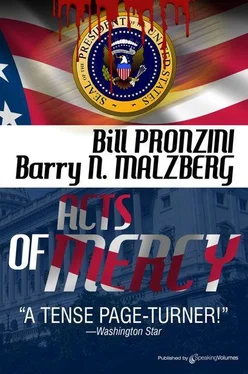Bill Pronzini - Acts of Mercy
Здесь есть возможность читать онлайн «Bill Pronzini - Acts of Mercy» весь текст электронной книги совершенно бесплатно (целиком полную версию без сокращений). В некоторых случаях можно слушать аудио, скачать через торрент в формате fb2 и присутствует краткое содержание. Жанр: Триллер, на английском языке. Описание произведения, (предисловие) а так же отзывы посетителей доступны на портале библиотеки ЛибКат.
- Название:Acts of Mercy
- Автор:
- Жанр:
- Год:неизвестен
- ISBN:нет данных
- Рейтинг книги:4 / 5. Голосов: 1
-
Избранное:Добавить в избранное
- Отзывы:
-
Ваша оценка:
- 80
- 1
- 2
- 3
- 4
- 5
Acts of Mercy: краткое содержание, описание и аннотация
Предлагаем к чтению аннотацию, описание, краткое содержание или предисловие (зависит от того, что написал сам автор книги «Acts of Mercy»). Если вы не нашли необходимую информацию о книге — напишите в комментариях, мы постараемся отыскать её.
Acts of Mercy — читать онлайн бесплатно полную книгу (весь текст) целиком
Ниже представлен текст книги, разбитый по страницам. Система сохранения места последней прочитанной страницы, позволяет с удобством читать онлайн бесплатно книгу «Acts of Mercy», без необходимости каждый раз заново искать на чём Вы остановились. Поставьте закладку, и сможете в любой момент перейти на страницу, на которой закончили чтение.
Интервал:
Закладка:
It occurs to us as we go to the window that we have, in spite of all our premeditation, acted with too much passion and not enough foresight in our planning. We might have chosen a better place for Briggs’s execution than his own office, than the White House. But it is too late to worry about that now. What is done is done.
We roll up the blinds, bind them into place, then unlatch the window and open it. Carefully we put our head out into the muggy night air. Floodlights illuminate the rose garden, the trees and shubbery on the south lawn, but the oleander bushes beneath the window are wrapped in shadow. Over by the south balcony, we see one of the security people walking his patrol-but after a moment he disappears around the east corner. There is no one else within the range of our vision; night security on the grounds is considerable, but it is also concentrated at the perimeters to guard against illegal entry.
We open the window all the way, return quickly to where Briggs lies sprawled on the carpet. We grasp him under the armpits, struggle with his inert weight to the window, and manage to lift him across the sill. Perspiration spots our forehead; the effort of moving Briggs has left us panting. We take a moment to catch our breath, looking out again at the grounds. They still appear deserted in all directions.
Leaning our shoulder against Briggs’s hip, we push him over the sill.
He falls loosely, making a whispery rustling sound in the oleanders and then a barely audible thump as he strikes the ground-not heavy enough to register on the sound-sensor equipment monitored by Security. When we peer down we see him lying in a pocket of heavy shadow, his arms folded under him, his head resting near one of several large decorative stones which border the oleanders. Our plan will work after all, we think. It will appear as though he was leaning out of the window, lost his balance, fell and struck his head on one of those stones. A tragic accident.
We turn from the window, leaving it open, and glance around the office. There is nothing out of place, no signs of violence. Satisfied, we cross to the door, open it, slip into the anteroom; and a moment later our steps echo hollowly in the empty corridor as we hurry away from the scene of our execution.
The scene of our act of mercy.
Seventeen
It was 10:25 when the telephone rang in the Oval Study.
The sudden sound made Augustine jerk his head up from Fred Fearnot and the Rioters, the Hal Standish railroad dime novel he was paging through. He looked at the Seth Thomas wall clock, noted the time. Pretty late for someone to be calling, he thought, unless it’s important business. He let the phone ring three more times while he rubbed at his tired eyes, took a sip of water from the tumbler on his desk blotter. Then he reached out and caught up the receiver.
“Yes?”
“Mr. President? This is Christopher Justice, sir. I have to see you right away. It’s urgent.”
“Urgent? At this time of night?”
“Yes sir, very urgent.”
“Where are you?”
“Downstairs in the press secretary’s office.”
“All right-come up then.”
“Thank you, sir.”
Augustine replaced the receiver. Justice’s voice had sounded grim, shaken, as if he were the harbinger of tragic news; and it would have to be something tragic, Augustine thought, to rattle someone of Christopher’s nature. A foreboding touched him, but it was ephemeral, directionless. He could not imagine what might have happened.
He picked up the dime novel again, carried it around his desk and across the room, and put it away in one of the glass-fronted cabinets. Restlessly he began to roam the study. Two minutes passed; three. He had stopped in front of the shelves of railroad lanterns and was running his fingers over the flared reflectors on one of them when the knock, soft but hurried, sounded on the door.
When he opened the door, the sense of foreboding deepened. Justice’s face was tightly set; his eyes, shadowed because of the dim light in both the hallway and the study, had a somber, uneasy appearance.
Augustine gestured him inside, shut the door. “My God, Christopher,” he said, “what is it, what’s happened?”
Justice said heavily, “It’s Mr. Briggs, sir.”
“Briggs?”
“Yes sir. He… I’m afraid he’s dead.”
“What!”
“It’s true, Mr. President. I was walking on the south lawn, getting some air because it was so hot in my room, and I noticed that the window in the press secretary’s office was open and the lights were on. But there was nobody inside, so I went over to have a look. I found him lying in the bushes under the window.”
“But how — how did it happen?”
“I’m not sure, sir. It looks as though he was leaning out for some reason and lost his balance and fell. He must have hit his head on one of the rocks.”
A hollowness had formed under Augustine’s breastbone, but he seemed to have no other reaction beyond a kind of shocked confusion. Sometimes you came up against something so stunning that you lacked the emotional language to deal with it immediately. He shook his head, walked over to the nearest piece of furniture-a leather couch-and sat on the arm and stared down at the carpet.
Across the study, the door to the presidential bedroom opened and Claire entered. “I thought I heard voices,” she said. “Is something-” Then she stopped speaking and ridges appeared on the smooth surface of her forehead.
Augustine said, “Claire, something terrible has happened.”
A shadow passed across her face. She caught the fabric of her blouse at the throat-she was still fully dressed, or she would not have entered as she had-and then came over to where he was sitting. “What is it?”
“It’s Austin Briggs. He’s dead.”
Her mouth opened and her face went white. “Oh my God,” she said.
“Christopher just found him, outside his office window.”
“Where?”
“It seems to have been a freak accident, Mrs. Augustine,” Justice said. He went on to tell her what he had told Augustine.
Claire said, “Are you certain he’s dead?”
“Yes ma’am. I checked his pulse.”
“Have you told anyone else?”
“No. I thought the President should be the first to know.” She closed her eyes, put her hands to her temples as though trying to clear her thoughts. Watching her, Augustine thought dully that the news seemed to have hit her even harder than it had him; he had never seen her quite so shaken.
Justice said, “Do you want me to notify the security chief, Mr. President?”
Before Augustine could answer, Claire lowered her hands and turned abruptly. “No,” she said. “Not yet. Don’t call anyone yet.”
“But Mrs. Augustine…”
“Don’t argue with me, please. We need time to think.”
Justice looked at Augustine, who nodded mutely. “Yes ma’am,” he said then. “Whatever you say.”
Claire bit her lip, and her eyes, dark and glistening, rested on Augustine for a long moment. Then she pivoted and hurried out of the study.
When the bedroom door closed behind her Augustine roused himself, went slowly to his desk and poured water into the tumbler there; drank it to ease the dryness in his throat. Some of the numbness began to leave him then, and in his mind he heard the echo of Claire’s voice saying We need time to think. Time to think about what? Briggs was dead, he had died in a tragic accident. In one sense it was unfortunate; and yet, looking at it another way, coldly and practically, it solved the problem of his political threat.
Time to think about what?
But it was already beginning to break in on Augustine, the same realization that must have struck Claire immediately: it was not the fact of Briggs’s death that demanded careful reflection, but the probable repercussions of it. He had died here at the White House, and under circumstances which were as bizarre as they were tragic. There had probably never been an accidental death on the White House grounds, no deaths of any kind here that he was aware of since President Harrison had succumbed to pneumonia in 1841. The story would make national headlines, would have the country buzzing for weeks. Members of the press and his political enemies would use it as a weapon to further attack the viability of the Augustine administration; some of the more vicious, muckraking types might even hint at Christ knew what type of scandal.
Читать дальшеИнтервал:
Закладка:
Похожие книги на «Acts of Mercy»
Представляем Вашему вниманию похожие книги на «Acts of Mercy» списком для выбора. Мы отобрали схожую по названию и смыслу литературу в надежде предоставить читателям больше вариантов отыскать новые, интересные, ещё непрочитанные произведения.
Обсуждение, отзывы о книге «Acts of Mercy» и просто собственные мнения читателей. Оставьте ваши комментарии, напишите, что Вы думаете о произведении, его смысле или главных героях. Укажите что конкретно понравилось, а что нет, и почему Вы так считаете.












